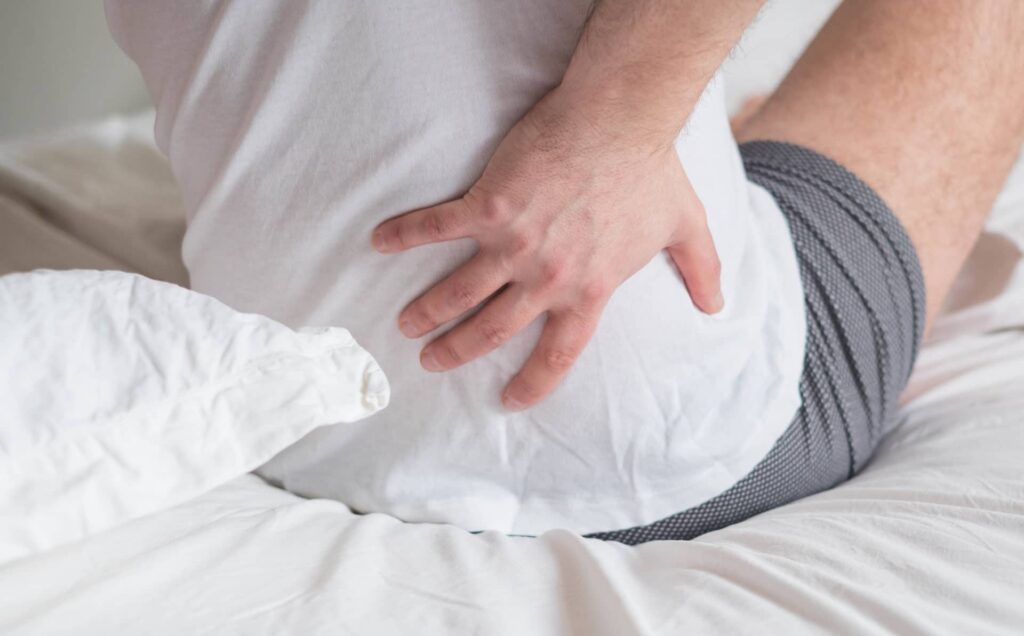Blog
Lower Back Pain When Sleeping: Causes, Treatment, and Prevention
Experiencing low back pain?
Low back pain is one of the leading causes of disability in the world. It affects both the general population and athletes alike. In fact, in accordance with the Australian Institute of Health and Welfare, more than 3.7 million people suffer from chronic back issues. Back pain can cause strong negative effects on a person’s quality of life, affecting their ability to participate in work, hobbies, family, and social activities. People have especially looked at different ways to find lower back pain treatment, exercises for lower back pain, and to find back pain treatment in Brisbane.
Why does my back hurt when I wake up? Why does it matter?
It is important to find out why the back hurts in order to understand how to relieve lower back pain. One of many causes of back pain can be related to sleeping posture. One thing that could cause increased discomfort in the back is the sleeping position. Depending on your sleeping posture, if it is unsupported, it can affect the pressure that is placed on your back which can cause spine alignment issues and even muscle stretch and strains. This can also give you hip pain.

Accordance to the National Sleep Foundation, sleeping on your stomach may have the greatest chance to cause an increase in pain in your low back. On top of that, Pregnant people should avoid sleeping on their stomach as well. When you are on your stomach, you will usually be in a twisted position where your neck is rotated towards the side to breathe. This moves the neck of alignment relative to other components in your spine.
Moreover, your torso will naturally sink more into the mattress causing possible arching of the back if the mattress is too soft. This can cause misalignment and increased pressures in the muscles and joints of your spine and therefore affect your ability to have good rest. Furthermore, if you have lower back pain treatment complications such as sciatica, sacro-iliac joint dysfunction, low limb nerve root irritation, and even possibly lumbar radiculopathy, pain can worsen much more if you are unable to support your spine to reduce the stress and pressure on it.
If you find back pain to be consistent when waking up from bed, this may lead to more chronic related issues in your back which can lead to further issues. Research has shown growing evidence of low back pain and sleeping problems. Low back pain during sleep can affect your ability to have a good night’s sleep. It can get quite difficult to find a comfortable position when falling asleep, and at worse, the pain can lead to nighttime awakenings. On the other hand, people with sleeping problems are shown to experience increased pain stimulus which can make the back pain even worse. Sleep deprivation can lead to impaired healing which may result in heightened pain sensitivity which can disrupt the usual chemicals of how we experience pain.
Tips and Treatment for Morning Back pain
Here are some things to consider in figuring out how to relieve lower back pain. If you sleep on your stomach and experience stiffness or soreness, you might want to try a new sleeping position. The best sleeping position for low back pain is on your side with a partial bend in the knees and even sleeping on your back. These two positions have been shown to have a greater amount of health benefits when compared to sleeping on your belly. You can also use pillows to support your knees, and abdomen if you’re sleeping on your belly to decrease the chance of excessive testing or misalignment of the spine.
Stretching Exercise
Exercise for lower back pain can help to reduce the pain. Stretching exercises can be very helpful to relieve back pain prior to getting in bed or even before you get out of bed. Exercises like the cat camel pose, knee rocks, and glute bridges have been shown to help manage reoccurring low back pain. These exercises can help to stretch your back while also relieving tension.
Cat Camel Pose
For lower back pain treatment, try the cat camel pose. Start on your hands and knees on the bed with your back in a natural position. Arch your back while lifting your head up and pushing your tailbone out making a U-shape with your spine. Hold this position for about 5-10 seconds. Next, bend your back up by tucking your head and tailbone in while pulling your belly button into your spine. This will make an opposite U-shape with your spine and hold this position for 5-10 seconds.
Staying Active
Exercises for lower back pain and staying active throughout the day will also be a great way to help in improving sleep quality. A simple exercise such as walking can be very beneficial to reduce pain and improve sleep. If you find yourself sitting for long durations at work, look to perform quick standing, stretching, or even walking breaks throughout the day. This will allow your body to be limber and less stiff throughout the day.
How does physiotherapy help relieve my back pain?
Many people who suffer from back pain can experience back pain for long periods of time. If the pain is not managed correctly, it can lead to more chronic related issues affecting function and everyday activities.
Back pain treatment in Brisbane with the help of Physiotherapists will be able to help identify whether your joints, muscles, or nerves are affecting your back pain. Whether it is a sprain, tear, neural tension, or joint dysfunction, our physios in Brisbane can assess and determine the primary contributing factor in why you are experiencing your back pain but also why they have been persisting as well. Back pain can originate from many different sources which is why it is important to assess every structure in your body to develop an individualised program for better lower back pain treatment. Depending on the severity and complication of the back pain, sessions can be managed from one session with education and exercises all the way to a couple of weeks/months with specific programming and manual therapy.
Treatment methods may include:
- Joint mobilisation
- Muscular release techniques
- Core stability strengthening
- Exercise program development
- Acupuncture/ dry needling
Working with a physio to find the root cause of the back will help to improve pain symptoms during sleep, but also help to prevent pain from coming back again. Medicare can help to cover your treatment sessions, so if you have any further questions, please contact our clinic to find out more details.


